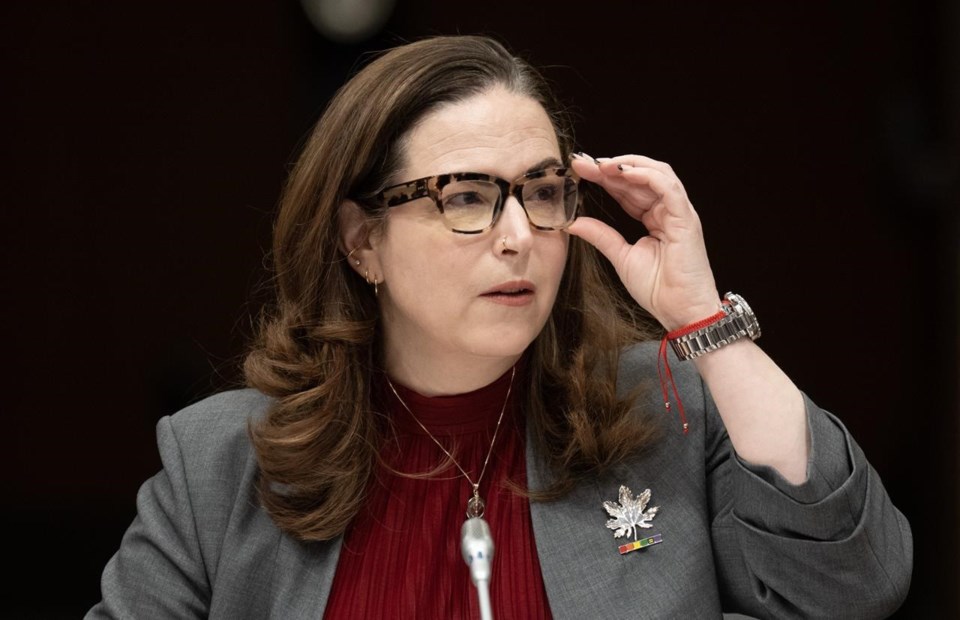OTTAWA — The federal Liberal government is rejecting a proposal from the Alberta government to consider adding a "unique chemical identifier" to the pharmaceuticals being offered to users as an alternative to street drugs.Â
Mental Health and Addictions Minister Ya'ara Saks wrote Monday to her counterpart in Alberta, saying that while she takes concerns about diversion seriously, the province's proposal raises practical concerns.Â
Critics, including some addiction specialists, want the federal government to reconsider its support for programs that offer drug users pharmaceuticals like hydromorphone as an alternative to street drugs.
Experts say the country's overdose crisis is largely being fuelled by an increasingly toxic drug supply. The majority of overdose deaths recorded from January to June 2023 involved fentanyl.Â
More than 40,000 people have died from opioid-related deaths since 2016, which is when the federal agency began collecting statistics on the phenomenon.
British Columbia was the first jurisdiction to offer drug users a supply of pharmaceutical alternatives through so-called "safer-supply" programs.
After the start of the COVID-19 pandemic in March 2020, Ottawa offered funds to other pilot programs in Ontario and New Brunswick, citing the heightened risk of pandemic-related restrictions and disruptions to the drug supply.Â
In the year since, critics have warned that some drug users are taking part in safer-supply programs, only to turn around and sell those drugs on the street.Â
The issue was flagged by Dr. Bonnie Henry, B.C.'s provincial health officer, as a "common occurrence" in her recent review of her province’s safer supply program.
The scope of the problem is unclear, Henry said, but it underlines how diversion poses a risk to individuals who are not already using drugs.
Alberta Premier Danielle Smith has rejected offering such alternatives in her province, instead saying they are focused on offering more recovery options.Â
Provincial data shows opioid-related overdose deaths in Alberta continue to spike.Â
Alberta Mental Health and Addictions Minister Dan Williams wrote to Health Minister Mark Holland earlier this month to express concerns about diversion, asking for "hard evidence" it was having an impact.
He suggested requiring that any drug prescribed under the safer-supply banner include an additional ingredient, a "unique chemical identifier that would allow testing of the drug's origin."Â
Such an addition would allow authorities to track where diverted supplies of the drugs are ending up, Williams argued.Â
But the letter from Saks makes clear she has doubts.Â
"It is unclear how this would work in practice, given these drugs are not manufactured specifically for these programs and are also used for other medical purposes such as pain management," she writes. Â
"I have asked my officials to reach out to yours to discuss some of the potential practical issues with this proposition."Â
Ottawa is working with safer-supply programs to ensure they have mitigation strategies in place, she continues — but the government also wants to confront "misconceptions and misinformation" around the policy.Â
"The idea that these programs are simply handing out drugs to anyone is false," Saks writes. Only a small number of jurisdictions offer such programs, which "serve relatively few clients," the letter notes.
In a statement Tuesday, Williams accused Saks and the federal government of ignoring Alberta's concerns.Â
In a recent interview with The Canadian Press, Saks dismissed the concerns of safer-supply critics as rooted in fear and stigma, prompting a stern response from a group of doctors and addiction experts.Â
"Please do not use stigma and fear to justify the harms caused by diverted safer supply medications," the physicians wrote to Saks.Â
"Street drugs should not be provided by government-funded programs. Funding of harm reduction programs needs to be contingent upon safe practices," including proper supervision, they warned.
A spokesman for Saks said the minister will continue to consider a range of opinions, noting she and Health Canada officials recently met with some of the doctors who oppose the initiative.Â
This report by The Canadian Press was first published Feb. 28, 2024.Â
Stephanie Taylor, The Canadian Press




